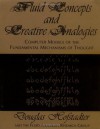251
Followers
4
Following
Manny Rayner's book reviews
I love reviewing books - have been doing it at Goodreads, but considering moving here.
Currently reading
The Greatest Show On Earth: The Evidence For Evolution
R in Action
Fluid Concepts and Creative Analogies
McGee on Food and Cooking: An Encyclopedia of Kitchen Science, History and Culture
Epistemic Dimensions of Personhood
Pattern Recognition and Machine Learning (Information Science and Statistics)
Relativity, Thermodynamics and Cosmology
The Cambridge Handbook of Second Language Acquisition
Doktor Glas
 This book has become quite well-known recently due to the theatre production starring Krister Henriksson. We saw it in London a few months ago, and it is indeed very good; but I was surprised to discover that the book is substantially different.
This book has become quite well-known recently due to the theatre production starring Krister Henriksson. We saw it in London a few months ago, and it is indeed very good; but I was surprised to discover that the book is substantially different. The eponymous Glas, as most people now know, is a doctor in late 19th century Stockholm who kills the husband of one of his patients. Fru Gregorius is young and beautiful; her husband is a hypocritical old priest whose very presence makes Glas feel physically sick. Gregorius's wife is secretly unfaithful to him, and Glas is the only person she has told. She cannot stand the fact that her husband still insists on having sex with her, and asks Glas if he can do anything.
In the play, Glas's motivation seems clear. A lonely person with no one to love, he falls for the beautiful wife's charm and agrees to everything she asks for; he came across as rather like M. Hire in Patrice Leconte's film, though things work out better for him.

But I experienced the book in another way. The central puzzle is why Glas murders the priest. The clear lines of the play are blurred; he is indeed very taken with the wife, but he could equally well have responded to Fröken Mertens, who is also young and beautiful, and clearly loves him. He chooses to ignore her, and there are more factors in play. Glas has always found sex disgusting. The girl he loved as a young man died in a tragic accident shortly after he kissed her for the first time. And so many of his female patients have begged him for abortions. He has consistently turned them down, but he's wondered more and more often if he's been right to do that.
Somehow, sex and death have got mixed up in Glas's cold, analytical mind. The book is the diary he starts keeping as he tries to disentangle things. He scrupulously weighs up the pros and cons of his various choices, discusses the morality of the situation, plans carefully to minimize the chance of being discovered, considers whether he's likely to suffer pangs of remorse. But after he's killed Gregorius, he still doesn't really know why he's done it. He rereads his notes, and decides he probably did the right thing, but he's not sure. All he can see is an infinite web of cause and effect stretching out into the past. He wishes he hadn't investigated it so carefully.
The book, too, has its own web of causes and effects. Several of the characters come from earlier Söderberg novels. The hunchbacked watch-maker who sells Glas the case in which he keeps the cyanide pills also appears in Förvillelser, Söderberg's first book; there, he marries the shop-girl that Thomas Weber gets pregnant. Martin Birck, a character that Glas often meets, is the hero of Martin Bircks Ungdom, written four years earlier, where he is pretty clearly Söderberg himself.
And although people at the time hated Doktor Glas and called it implausible and immoral, it has aged well. The edition I read has a postscript briefly explaining how it was chosen in 2002 to be the first book in the series Stockholm läser - "Stockholm reads". I think Söderberg would have been touched by this gesture of appreciation from the city he loved so much, and I am sure Swedes, and in particular people from Stockholm, will carry on reading it for a long time to come.












 1
1
